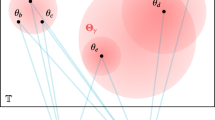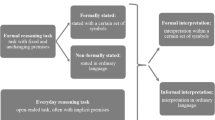Abstract
In recent years there have been several attempts to construct inductive arguments for some version of scientific realism. Neither the characteristics of what would count as inductive evidence nor the conclusion to be inferred have been specified in ways that escape sceptical criticism. By introducing the pragmatic criterion of manipulative efficacy for a good theory and by sharpening the specification of the necessary inductive principle, the viability of a mutually supporting pair of argument forms are defended. It is shown that by the use of these forms, taken together, a sequence of inductive arguments could be constructed, given suitable cases histories to serve as evidence. It also shown that the best inductive argument for the most daring realist claim is the weakest when compared with similarly structured arguments for less daring claims.
Similar content being viewed by others
References
Aronson, J. L.: 1988, ‘Testing for Convergent Realism’, Proceedings of the 1988 Biennial Meeting of the Philosophy of Science Association.
Aronson, J. L.: 1991, ‘Verisimilitude and Type-Hierarchies’, Philosophical Topics 18, 5–28.
Aronson, J. L., Harré, R., and Way, E. C.: 1994, Realism Rescued, Duckworth, London.
Boyle, Hon. R.: 1666, The Origins of Forms and Qualities According to the Corpuscular Philosophy Davis, Oxford.
Cartwright, N.: 1983, How the Laws of Physics Lie, Clarendon Press, Oxford.
Clavius, C.: 1602, In Sphaeram de Ionnanis de Sacrobosco, Lyons.
Giere, R. L.: 1988, Explaining Science: A Cognitive Approach, Chicago University Press, Chicago.
Hacking, I.: 1983, Representing and Intervening: Introductory Topics in the Philosophy of Natural Science, Cambridge University Press, Cambridge.
Harré, R.: 1961, Theories and Things, Sheed and Ward, London.
Harré, R.: 1986, Varieties of Realism, Blackwell, Oxford.
Laudan, L.: 1984, ‘A Confutation of Convergent Realism’, in J. Leplin (ed.), Scientific Realism, University of California Press, Berkley, pp. 218–49.
Lipton, P.: 1991, Inference to the Best Explanation, Routledge, London.
Newton-Smith, W.: 1981, The Rationality of Science, Routledge and Kegan Paul, London.
van Fraassen, B.: 1980, The Scientific Image, Clarendon Press, Oxford.
Author information
Authors and Affiliations
Additional information
A popular version of this argument appeared in Perspectives on Science, 1994.
Rights and permissions
About this article
Cite this article
Harré, R. From observability to manipulability: Extending the inductive arguments for realism. Synthese 108, 137–155 (1996). https://doi.org/10.1007/BF00413494
Issue Date:
DOI: https://doi.org/10.1007/BF00413494




